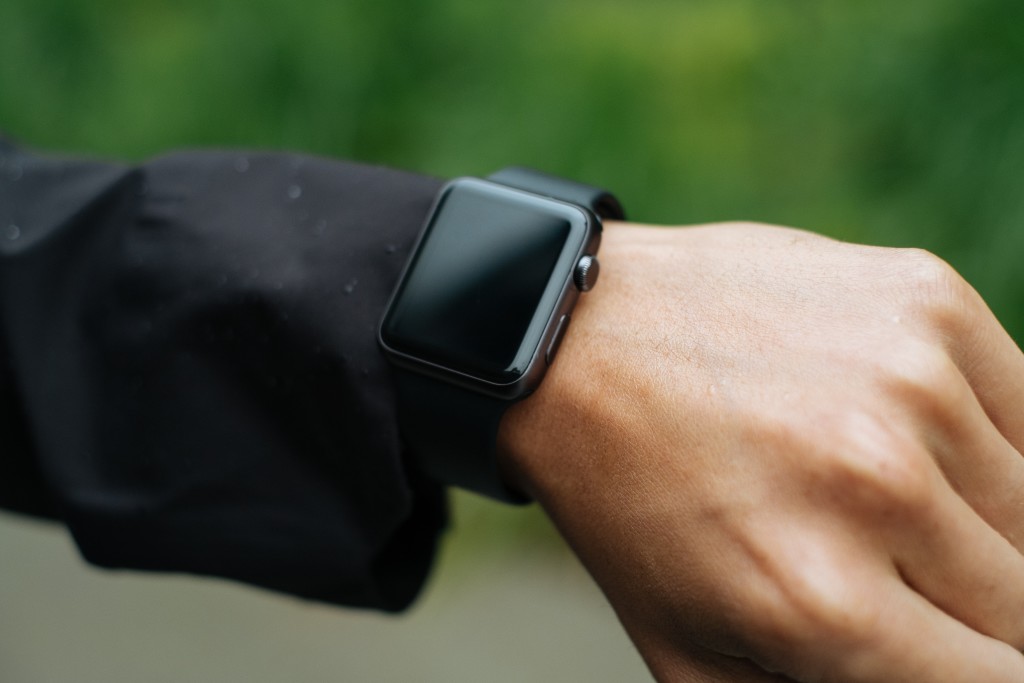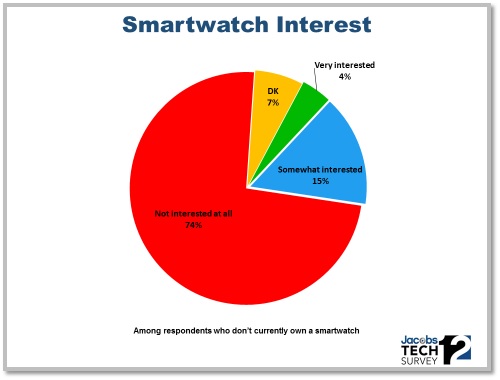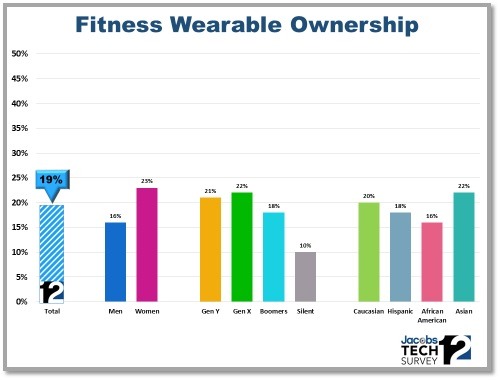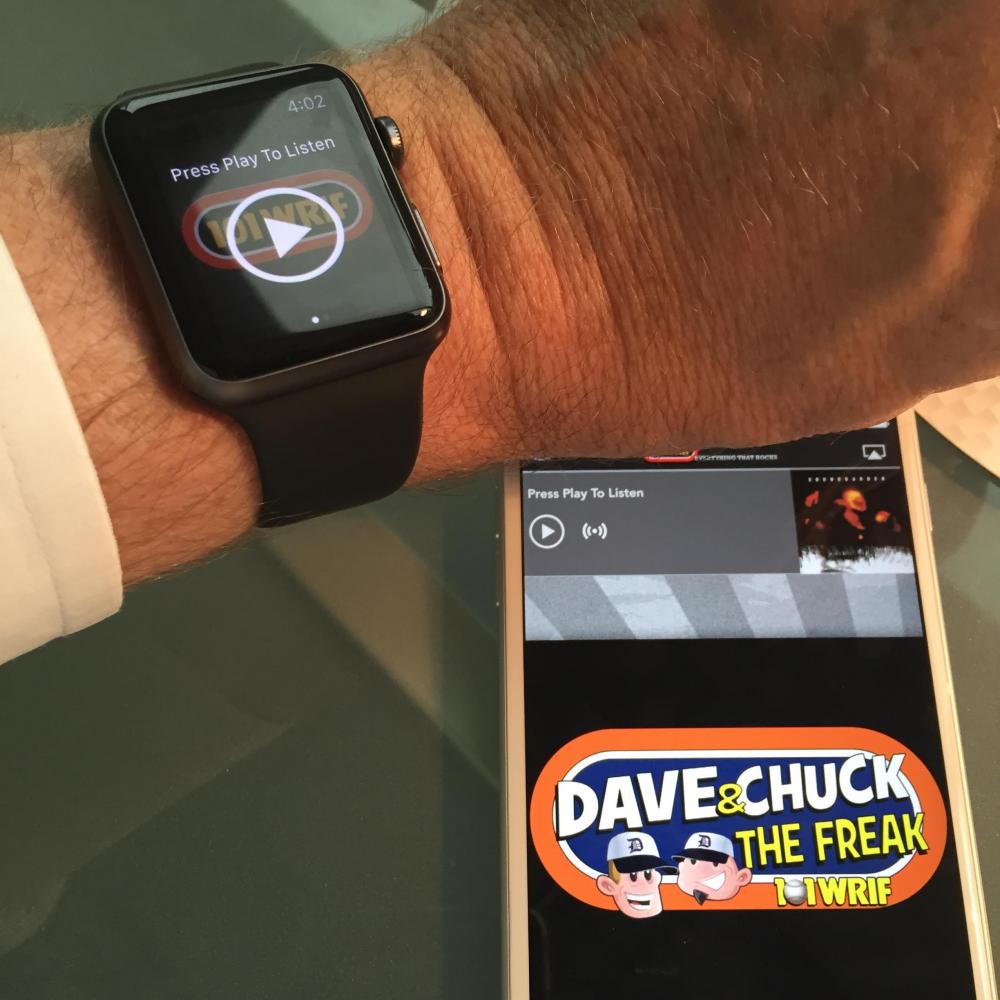
Sometimes birthdays just aren’t a whole lotta fun. The Apple Watch turned 1 year-old this week, and last I checked, there wasn’t confetti raining down from the skies or celebration parties taking place around the world.
It’s been an interesting period for Apple, punctuated by yesterday’s disappointing economic numbers. For the first time in 13 years, Apple’s revenue declined, driven largely by weakening iPhone sales.
While some say the Apple Watch is actually doing pretty well (the company doesn’t release sales numbers), you simply don’t hear much buzz about the device anywhere you go, whether its friends, co-workers, or family members. That’s not very Apple-like.
If you were a stakeholder in this year’s Techsurvey12, you saw this coming. In last year’s survey, we asked our first question about smartwatch ownership, and logged the result in our Media Usage Pyramid. Only 2% of our sample had one on their wrists, but the Apple Watch was yet to be released. We were interested in knowing just how big a jump this category might take in this year’s study after the Apple Watch debut exactly one year ago.
Techsurvey12 reveals that even with the addition of the much-ballyhooed Apple technology, these gadgets that held so much promise are still searching for a value proposition.
Our study shows that ownership has doubled – but only from 2% to 4%. And when you ask those who don’t own one about their interest in purchasing a “smartwatch,” the results are underwhelming. Only 4% express considerable interest in this gadget, while nearly three-fourths see no need in investing several hundred dollars to purchase a gadget they’re just not sure what it does:

CNET recently posed the question about satisfaction to a group of their editors who excitedly purchased an Apple Watch exactly a year ago. These are the people who geek out on a product like this. And as you’ll see on the video below, responses are somewhere between lukewarm and disappointing. In fact, some have given up on wearing their Apple Watch altogether.
The problem? There are several, ranging from the gadget being too complicated, mediocre software, and a lack of apps. But the biggest issue is that these smartwatches don’t really do anything all that special – certainly anything your iPhone cannot do.

Nearly a fifth of our 39,500+ mega-sample say they own one of these gadgets, especially women, members of Gen X and Y, as well as Asian Americans. Some of have said the future of the Apple Watch may be related to health and fitness, something that Fitbit and others have already tapped into.
Like any other stream, app, or gadget, consumers need to understand and appreciate its purpose. It has to offer something they cannot get anywhere else. Whether we’re devising a new format or a new morning show, these same questions revolving around the customer value proposition are central to achieving success.
In this case, Apple may have rushed its watch and/or hoped that on the strength of its amazing brand, consumers would help guide its applications and its success. To a great degree, that’s what propelled the smartphone and apps. The technology was excellent, and outsourcing apps to outside developers enhanced the gadget.
And in fairness, many forget the first iPhone released in 2007 was not an overnight success, with sales of only about 6 million units that year. It wasn’t until the advent of the App Store in the next year that iPhone became that must-have device. Many estimate Apple Watch sold as many as 12-13 million units in its first year, so perhaps the numbers aren’t as bad as many observers think.
But determining that greater purpose for Apple Watch is still the question that hangs over Cupertino. For the iPhone it was apps, and you heard that complaint about Apple Watch from one of the CNET editors. Early on, our jacapps mobile app development team cracked the Apple Watch code, and created apps for this wearable. As part of the “App Everywhere” initiative, it’s essential for radio to have its apps in as many gadgets, devices, and dashboards as possible. If Apple Watch ever catches on, a “wrist radio” could become yet another place where consumers could easily access any station, show, or podcast. In an world where radio’s portability (outside the car) has been greatly diminished, the smartwatch hold promise and potential.

But until Apple answers the key questions facing its much-hyped wearable, mass market success is not a fait accompli:
What does it do that my iPhone can’t do?
What job(s) does it do for those who wear it?
What problems does it solve?
Why do I have to shake my wrist just to see the time?
Don’t underestimate Apple’s ability to address these questions and figure its Apple Watch out.
It’s probably just a matter of time.
- Why “Dance With Those Who Brung You” Should Be Radio’s Operating Philosophy In 2025 - April 29, 2025
- The Exponential Value of Nurturing Radio Superfans - April 28, 2025
- What To Do If Your Radio Station Goes Through A Midlife Crisis - April 25, 2025




Why don’t I have an Apple Watch? Why did I get rid of my iPhone?
Simple…Apple’s insatiable desire to make everything it makes completely proprietary.
If you already own your music, too bad. You need to buy it again from the iTunes store to put it on your phone. Need an app? Buy it from them. And on and on and on. Don’t even get me started on Mac computers, which are wonderful products…but the same thing. Apple wants to be a monopoly. I’m not going to help them get there. They have created some very innovative things, I’ll give them credit. But Apple needs to work for consumers, not against them.
Kevin, thanks for the comment. That balance between customer focus and commerce is always a tough one. Clearly, this device lacks some of the basic amenities necessary to create a true category.